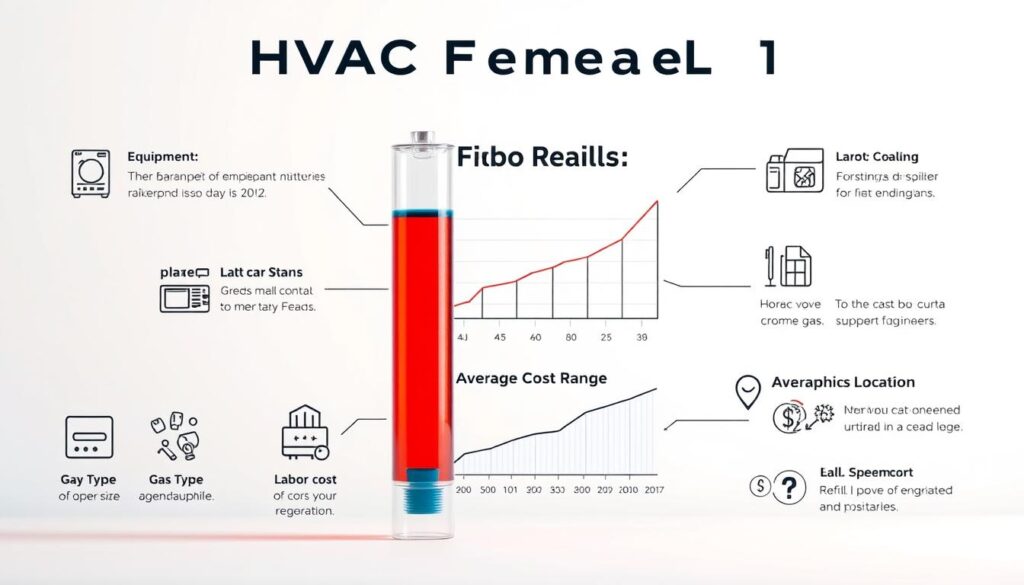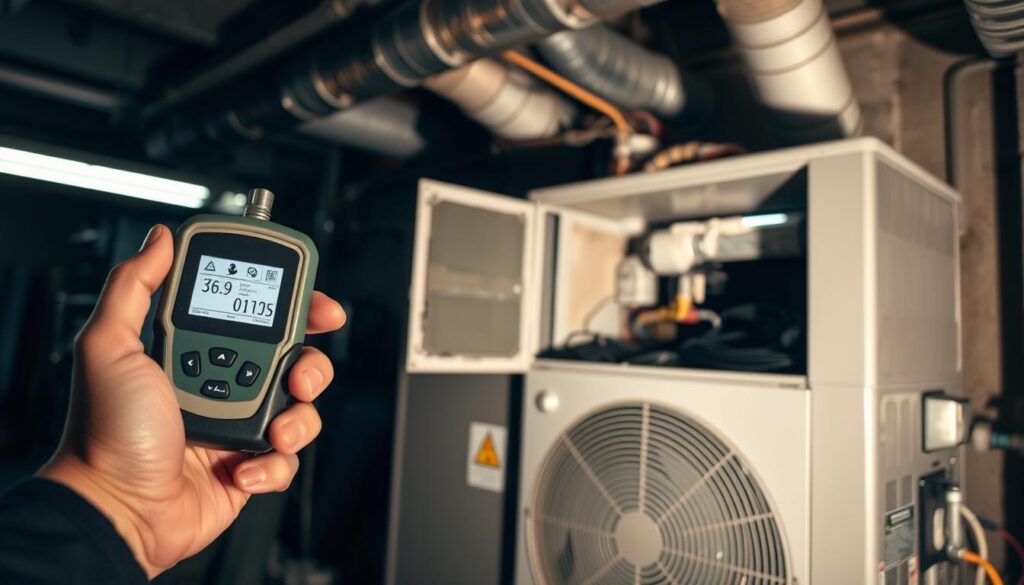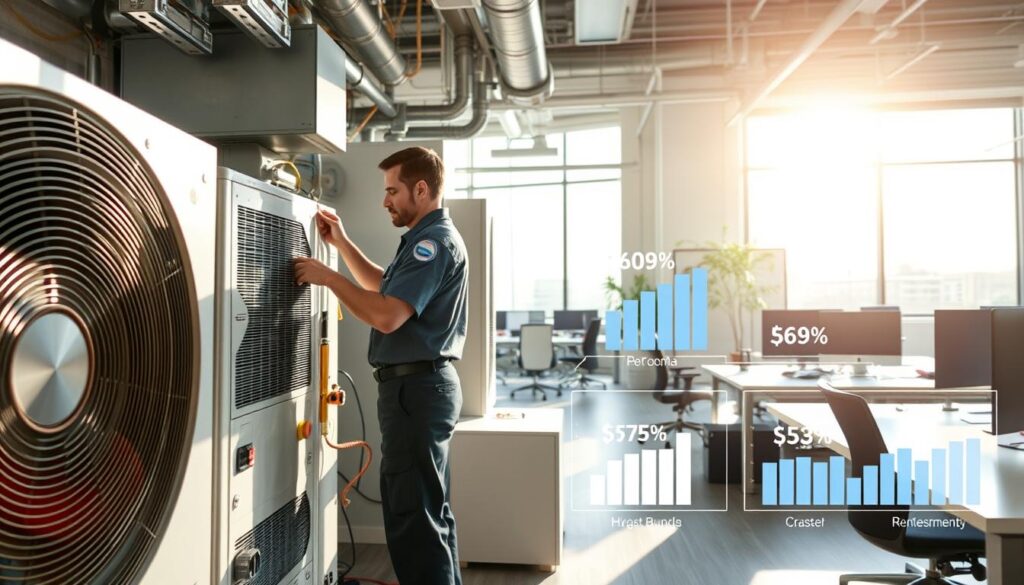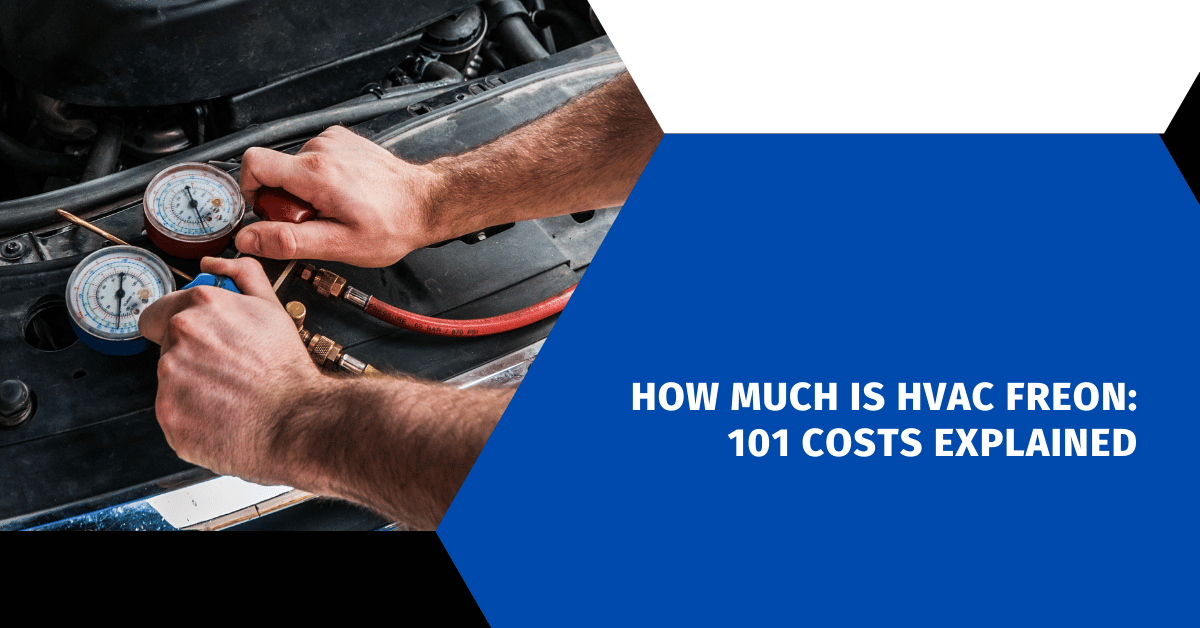Affiliate Disclosure
HVAC Guide Guys is a participant in the Amazon Services LLC Associates Program, an affiliate advertising program designed to provide a means for sites to earn advertising fees by advertising and linking to Amazon.
How Much Is HVAC Freon? Ever wondered why your air conditioning repair bill seems to climb faster than summer temperatures? Understanding HVAC Freon costs can save you thousands in unexpected expenses. The world of refrigerant pricing is changing rapidly, with environmental regulations transforming how we cool our homes.

When it comes to how much HVAC Freon actually costs, homeowners are often surprised by the complexity. The pricing isn’t just about a simple refill – it’s about understanding a sophisticated system of environmental regulations, refrigerant types, and repair considerations.
Modern HVAC systems require strategic knowledge about refrigerant expenses. Whether you’re dealing with an older R-22 system or exploring newer eco-friendly alternatives, knowing the true cost of HVAC Freon can help you make smarter maintenance decisions.
Key Takeaways
- R-22 Freon is being phased out due to environmental concerns
- Average AC leak repair ranges from $125 to $1,550
- Refrigerant costs vary based on system type and size
- Environmental regulations significantly impact refrigerant pricing
- Professional maintenance can help reduce long-term HVAC expenses
Table of Contents
Understanding HVAC Refrigerant Basics
Your air conditioning system needs a key part to keep your home cool and comfy: refrigerant. These special chemicals are key to cooling your HVAC system. Knowing about hvac refrigerant types and how they work helps you care for your AC better.
Refrigerants are special substances that take heat from indoor air and move it outside. They go through your AC system, changing from liquid to gas to cool your space. The right ac freon replacement is important for your system’s efficiency and how well it works.
How Refrigerant Works in Your AC System
The refrigeration cycle has several important steps:
- Absorbing heat from indoor air
- Compressing the refrigerant
- Releasing heat outside
- Expanding and cooling back to a liquid state
Common HVAC Refrigerant Types
There are different refrigerants used over time, each with its own special qualities:
- R-22 (Freon): Older refrigerant being phased out
- R-410A (Puron): Current standard for most residential systems
- R-32: Newer, more environmentally friendly option
The Importance of Proper Refrigerant Levels
Having the right amount of refrigerant is key for your AC system’s performance. Too little refrigerant can make your system cool less, increase your energy bills, and even damage it. Regular checks by professionals help keep your system running at its best.
Explore Our HVAC Shop
Looking for top-rated HVAC tools, parts, and accessories? Visit our shop and find the perfect solution for your needs.
Visit the ShopHow Much Is HVAC Freon: Current Market Prices
Understanding refrigerant prices helps you plan your HVAC maintenance budget. The cost of freon recharge depends on several factors that affect your expenses.
Refrigerant prices vary a lot in the market. R-22 Freon, which is being phased out, costs between $50 and $80 per pound. A full AC system recharge can cost between $100 and $600, based on your system’s needs.
| Refrigerant Type | Price per Pound | Average Recharge Cost |
|---|---|---|
| R-22 (Freon) | $50 – $80 | $300 – $600 |
| R-410A | $30 – $50 | $100 – $350 |
| Newer Alternatives | $40 – $70 | $200 – $500 |
Several factors influence refrigerant prices:
- Supply and demand dynamics
- Environmental regulations
- Production and manufacturing costs
- Availability of alternative refrigerants
“Knowing your refrigerant costs can help you make informed HVAC maintenance decisions.” – HVAC Professional
Before getting a freon recharge, talk to a professional technician. They can assess your system’s needs and give you the latest pricing.
Explore Our HVAC Shop
Looking for top-rated HVAC tools, parts, and accessories? Visit our shop and find the perfect solution for your needs.
Visit the ShopFactors Affecting Freon Replacement Costs
Knowing what affects your hvac freon cost helps you plan better for refrigerant upkeep. Several important factors can change the cost of a freon refill. This makes each HVAC system’s service different.
Freon replacement is more than just a price. Many things affect how much you’ll pay for refrigerant service.
System Size and Complexity
The size of your HVAC system is key in figuring out freon refill costs. Different systems need different amounts of refrigerant:
- Window AC units: Lowest cost and least refrigerant needed
- Mini-split systems: Mid-range refrigerant requirements
- Central AC units: Most expensive, largest refrigerant volume
Labor and Service Fees
Professional help comes with a cost. Technician rates can greatly affect your total hvac freon cost. These rates usually range from $100 to $500, based on service complexity.
| Service Type | Average Cost Range |
|---|---|
| Basic Freon Refill | $100 – $250 |
| Complex Leak Repair | $200 – $500 |
| Emergency Service | $250 – $600 |
Geographic Location Considerations
Your location can really change freon refill prices. Places with higher living costs, like cities, often have pricier HVAC services. This is different from rural areas.
Pro tip: Always get multiple quotes and check local regulations regarding refrigerant handling to ensure you’re getting a fair price for your freon refill.
Signs Your AC System Needs Refrigerant

Spotting an hvac refrigerant leak early can prevent costly fixes and keep your home cool. Your AC needs the right amount of refrigerant to work well. If levels drop, it can’t cool your space right.
- Reduced cooling performance
- Unexplained increase in energy bills
- Ice formation on refrigerant lines
- Unusual sounds from the AC unit
If your air conditioner isn’t cooling as it should, it might need a freon recharge. Warm air blowing from vents is a clear sign you need help.
| Symptom | Potential Refrigerant Issue |
|---|---|
| Weak airflow | Possible refrigerant leak |
| Higher electricity costs | System working harder to cool |
| Hissing sounds | Active refrigerant leakage |
Professional HVAC techs can find and fix refrigerant problems fast. Don’t ignore these signs, as they can cause bigger damage and expensive fixes.
Regular maintenance helps prevent unexpected refrigerant issues and extends your AC system’s lifespan.
Explore Our HVAC Shop
Looking for top-rated HVAC tools, parts, and accessories? Visit our shop and find the perfect solution for your needs.
Visit the ShopThe Cost of Detecting and Repairing Refrigerant Leaks
Dealing with an hvac refrigerant leak can be complex and costly for homeowners. It’s important to understand how to detect and repair leaks. This helps keep your air conditioning system running well and avoids unexpected expenses.
Finding a refrigerant leak needs special skills and tools. HVAC experts use different methods to spot and fix ac freon replacement problems:
- Electronic Leak Detection ($125-$1,200)
- Uses advanced electronic sensors
- Finds the exact spot of refrigerant leaks
- Most precise detection method
- Dye Detection ($25-$250)
- Injects fluorescent dye into the system
- Shows where leaks are under UV light
- A cost-effective way to diagnose
- Bubble Test ($10-$20)
- Uses a simple soap solution
- Bubbles show where refrigerant is leaking
- A basic way to find leaks first
Professional Repair Services
Fixing hvac refrigerant leaks costs between $200 and $1,500. The price varies based on the leak’s size, how easy it is to get to, and the repair needed. Small leaks might just need sealing, but big problems could mean replacing parts.
Additional Repair Expenses
There are also other costs you might face:
- Refrigerant recharging
- Replacing damaged parts
- Testing how well the system works
“Fixing refrigerant leaks quickly can save you a lot of money in the long run. It keeps your system running efficiently and saves energy.”
Pro tip: Regular maintenance can prevent expensive ac freon replacement and catch leaks early.
Environmental Regulations and Freon Phase-Out
The world of HVAC refrigerants has seen big changes thanks to strict environmental rules. Knowing about the impact of freon on the environment is key to understanding these changes.
The Environmental Protection Agency (EPA) has put strict limits on harmful refrigerants. In 2020, a big decision was made to ban R-22 freon in the U.S. This was a major step in freon regulations.
- R-22 completely phased out by 2020
- HFC refrigerants targeted for reduction starting 2023
- Mandatory transition to eco-friendly alternatives
These changes affect HVAC system owners a lot. You’ll need to find new refrigerants that are better for the environment. The main goals are to cut down on global warming and ozone depletion.
“Protecting our environment requires innovative solutions in refrigeration technology.” – EPA Climate Protection Division
To keep up, homeowners and businesses must:
- Update their HVAC systems
- Choose environmentally friendly refrigerants
- Work with certified HVAC experts
| Refrigerant Type | Environmental Impact | Regulatory Status |
|---|---|---|
| R-22 (Freon) | High Global Warming Potentia | Banned |
| R-410A | Moderate Impact | Phase-out Initiated |
| R-32 | Low Global Warming Potentia | Recommended Replacement |
Keep up with these changing freon rules to make smart choices for your HVAC system.
Alternative Refrigerants and Their Costs
Homeowners are looking into new refrigerants that are better for the planet and work well. Knowing about different hvac refrigerant types helps you choose the right cooling system.
The HVAC world is moving towards greener refrigerants. Old refrigerants are being replaced by new, eco-friendly ones. These new options are more energy-efficient and have lower global warming impact.
R-410A (Puron) Pricing Breakdown
R-410A, or Puron, has been common for years. Prices for R-410A refrigerant are between $50 to $100 per pound. It’s known for:
- Higher cooling efficiency
- Better environmental performance than older refrigerants
- Being slowly replaced by newer options
Modern Eco-Friendly Refrigerant Options
New refrigerant technologies are changing the HVAC field. Two notable options are:
- R-32: A low-global warming refrigerant with great energy efficiency
- R-454B: An eco-friendly choice with less climate impact
These modern refrigerants bring big benefits. Prices for these newer types are similar, ranging from $60 to $120 per pound. Costs depend on market conditions and availability.
The future of HVAC cooling is in sustainable, high-performance refrigerants. They balance environmental care with new technology.
Explore Our HVAC Shop
Looking for top-rated HVAC tools, parts, and accessories? Visit our shop and find the perfect solution for your needs.
Visit the ShopPreventive Maintenance and Cost Savings

Keeping your HVAC system in top shape is key to avoiding expensive repairs. Regular maintenance can cut down on hvac freon costs and make your cooling system last longer.
There are a few important steps to keep your system running well:
- Annual professional HVAC inspections
- Regular filter replacements
- Cleaning air intake and exhaust vents
- Checking refrigerant levels
- Inspecting for possible leaks
Homeowners who act early can save a lot of money. Small maintenance investments now prevent costly system breakdowns later. Experts say to get maintenance twice a year – once before summer and once before winter.
Regular maintenance offers many benefits:
- Less chance of sudden breakdowns
- Lower energy use
- Longer equipment life
- Less need for freon recharge
“An ounce of prevention is worth a pound of cure” perfectly describes HVAC system care.
By choosing regular maintenance, you’ll save on hvac freon costs. And your cooling system will work well for many years.
Conclusion
Understanding HVAC refrigerant can be tricky, but knowing the cost of HVAC Freon is key for homeowners. The cost of replacing your AC freon depends on several things. These include the type of refrigerant, your system’s details, and the prices in your area.
Environmental rules are changing the refrigerant world. They’re moving towards greener options. This means older refrigerants like R-22 are being replaced by newer ones like R-410A. This change affects both the availability and cost of AC freon services.
Planning ahead can help control your HVAC refrigerant costs. Keeping up with maintenance, finding leaks fast, and knowing market trends are important. Choosing modern, efficient systems might cost more upfront. But, it can save you money and help the environment in the long run.
Be proactive about your HVAC system’s refrigerant needs. Talk to professional HVAC technicians for advice that fits your system and local laws. Being informed and ready can help you manage your cooling system’s performance and costs.
FAQ
What is Freon and why is it important in HVAC systems?
How much does a Freon recharge typically cost?
What is Freon and why is it important in HVAC systems?
How much does a Freon recharge typically cost?
FAQ
What is Freon and why is it important in HVAC systems?
Freon is a refrigerant used in air conditioning systems. It absorbs and transfers heat, cooling your home. It changes from liquid to gas and back, creating the cooling effect you feel.
How much does a Freon recharge typically cost?
The cost of a Freon recharge varies. It depends on your system type and refrigerant. It usually ranges from 0 to 0. R-22 Freon is more expensive, costing 0 to
FAQ
What is Freon and why is it important in HVAC systems?
Freon is a refrigerant used in air conditioning systems. It absorbs and transfers heat, cooling your home. It changes from liquid to gas and back, creating the cooling effect you feel.
How much does a Freon recharge typically cost?
The cost of a Freon recharge varies. It depends on your system type and refrigerant. It usually ranges from $100 to $600. R-22 Freon is more expensive, costing $300 to $1,500. Newer refrigerants like R-410A are less expensive.
Why is R-22 Freon being phased out?
R-22 Freon is being phased out because it harms the environment. It contains HCFCs that damage the ozone layer. The HVAC industry is moving to eco-friendly alternatives like R-410A and R-32.
What are signs that my AC system needs a refrigerant recharge?
Signs include reduced cooling, longer run times, and higher energy bills. Ice on refrigerant lines and unusual noises are also indicators. If you notice these, get a professional to check your system.
Can I add Freon to my AC system myself?
No, adding refrigerant needs special training and certification. Only EPA-certified technicians can legally recharge refrigerants. Doing it yourself can damage your system and break environmental laws.
How often should my HVAC system have its refrigerant checked?
It’s recommended to check refrigerant levels annually during maintenance. This catches leaks early, keeps your system running well, and avoids expensive repairs.
What are the most environmentally friendly refrigerant alternatives?
R-410A, R-32, and R-454B are eco-friendly alternatives. They have lower GWP than R-22 Freon. They meet strict environmental regulations.
How do refrigerant costs vary by geographic location?
Refrigerant costs vary by location. Climate, market demand, transportation costs, and regulations affect prices. Areas with extreme temperatures or strict policies might have higher prices.
What impacts the overall cost of a refrigerant replacement?
Several factors affect refrigerant replacement costs. These include system size, refrigerant type, labor rates, and required repairs. A professional assessment is key for accurate costs.
Are there ways to reduce HVAC refrigerant-related expenses?
Yes, regular maintenance and addressing leaks can help. Keeping your system efficient and investing in modern equipment also reduce costs.
,500. Newer refrigerants like R-410A are less expensive.
Why is R-22 Freon being phased out?
R-22 Freon is being phased out because it harms the environment. It contains HCFCs that damage the ozone layer. The HVAC industry is moving to eco-friendly alternatives like R-410A and R-32.
What are signs that my AC system needs a refrigerant recharge?
Signs include reduced cooling, longer run times, and higher energy bills. Ice on refrigerant lines and unusual noises are also indicators. If you notice these, get a professional to check your system.
Can I add Freon to my AC system myself?
No, adding refrigerant needs special training and certification. Only EPA-certified technicians can legally recharge refrigerants. Doing it yourself can damage your system and break environmental laws.
How often should my HVAC system have its refrigerant checked?
It’s recommended to check refrigerant levels annually during maintenance. This catches leaks early, keeps your system running well, and avoids expensive repairs.
What are the most environmentally friendly refrigerant alternatives?
R-410A, R-32, and R-454B are eco-friendly alternatives. They have lower GWP than R-22 Freon. They meet strict environmental regulations.
How do refrigerant costs vary by geographic location?
Refrigerant costs vary by location. Climate, market demand, transportation costs, and regulations affect prices. Areas with extreme temperatures or strict policies might have higher prices.
What impacts the overall cost of a refrigerant replacement?
Several factors affect refrigerant replacement costs. These include system size, refrigerant type, labor rates, and required repairs. A professional assessment is key for accurate costs.
Are there ways to reduce HVAC refrigerant-related expenses?
Yes, regular maintenance and addressing leaks can help. Keeping your system efficient and investing in modern equipment also reduce costs.

